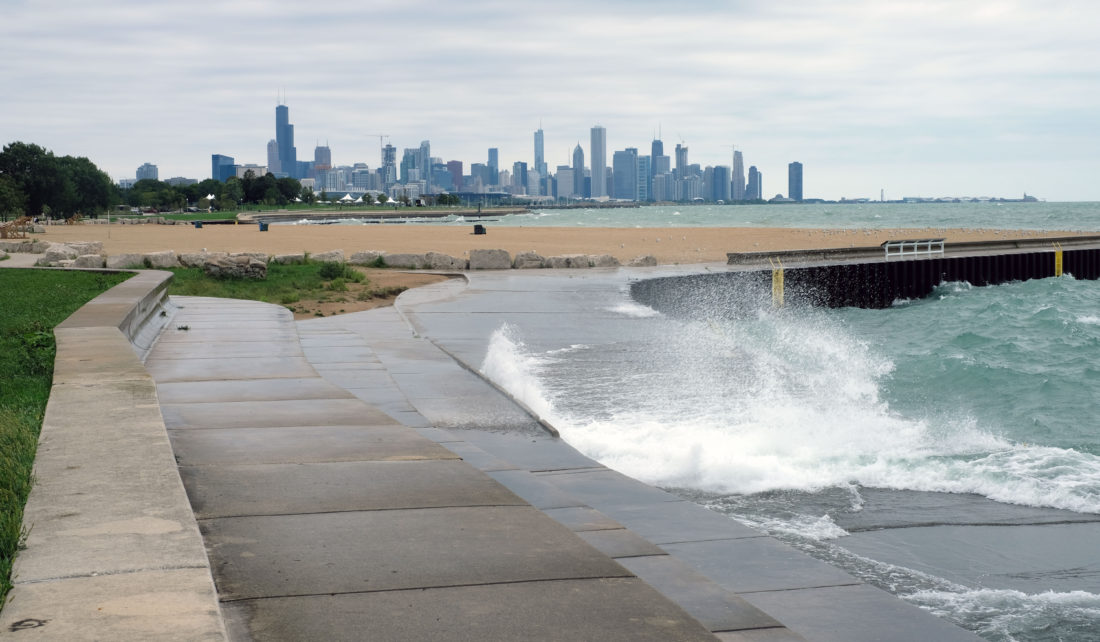We thought the following news from the Illinois-Indiana Sea Grant program would be of interest to our members.
Lake levels workshops highlight the need for information sharing
In light of last year’s high water levels in Lake Michigan and other Great Lakes, repeatedly breaking monthly records, Illinois-Indiana Sea Grant (IISG) brought together resource managers, experts, scientists and community leaders in October to improve understanding of changing lake level impacts and management implications. The group began a process of sharing information and ideas.
While lake levels reached a high mark in 2020, not long ago, in 2012−13 in fact, Lake Michigan’s water level was at a record low. At the time, hydrologists and others were concerned about ships navigating in shallower waters and the need for dredging, among other issues.
Conversely, record and near-record high water levels in 2020 led to submerged docks, flooded transportation infrastructure, including Chicago’s Lake Shore Drive, inundated coastal areas and eroding shorelines. Higher water levels can cause irreversible, lasting damage to the shoreline and structures, as well as to habitats.
The virtual workshops, which took place over four afternoons, were focused on the southwestern Lake Michigan region, which includes Chicago and industrialized areas south of Chicago and in Indiana, as well as unique stretches of precious coastal habitat such as the Indiana Dunes National Park, along with other state-protected natural areas.

With 30−40 participants each day, the sessions combined presentations with small group discussions to identify specific issues and define available and needed resources. These conversations brought some common themes to the front.
“Participants stressed the need to keep up with the best available science and experts in the field,” said Veronica Fall, IISG climate specialist. Fall, along with Carolyn Foley, the program’s research coordinator, organized and hosted the workshop series.
In addition, the discussions brought out the need to apply information to long-term planning and management, given projections for increased water level variability, and, specifically, water safety concerns were highlighted.
The group also focused on the need to share information, stressing the importance of knowing people’s expertise so that it is clear whom to contact with questions. Participants expressed the importance of engaging and sharing information with diverse audiences.
“They agreed on the need to pull together lists of available resources for use by Lake Michigan shoreline communities, and ensure these are being equitably shared,” said Foley. “Some participants have already indicated that they will be revising how they share information in response to thoughts shared during these workshops.”
You can find the workshop report in IISG’s publications database. Presentations by workshop participants from the U.S. Army Corps of Engineers, National Oceanic and Atmospheric Administration, National Weather Service, Federal Emergency Management Agency, Cook County Emergency Management and Regional Security, the Illinois State Geological Survey, and more are available via IISG’s YouTube channel.
WORKSHOP VIDEOS
- John Allis – Great Lakes Water Levels
- Laurie Smith-Kuypers – Improving Great Lakes Communication About Changing Lake Levels
- Dave Handwerk – Improving Communication About Changing Lake Michigan Water Levels: USACE Chicago District
- Kim Nowicki – Regional Response to Rising Lakefront Water Levels
- Ricky Castro – National Weather Service Lakeshore Flood Services
- Vidya Balasubramanyam – Prairie Research Institute & Illinois DNR Coastal Management Program Support for Shoreline Management
- Mark Wagstaff & Margaret Boshek – Communication Strategies for Lake Level Change
- Luke Zoet – Coastal Shoreline Research from University of Wisconsin-Madison
- Deanna Apps – Great Lakes Water Levels: Short-term Impacts
- Robin Mattheus – High Lake Levels & the Illinois Coast: Some Insights from Illinois Beach State Park
- Lauren Fry – Great Lakes Hydrology
- Brandon Krumwiede – Understanding Long-Term Coastal Impacts of Water Level Changes in Lake Michigan
- Cam Davis – Coastal Communications for Impact
- Mark Breederland – Coastal Resiliency Communication: A Flipped Classroom Case Study in Process
Illinois-Indiana Sea Grant is a part of University of Illinois Extension and Purdue Extension.

